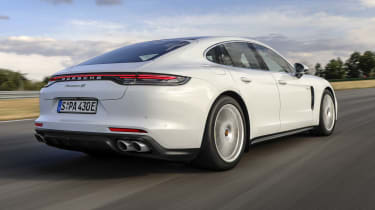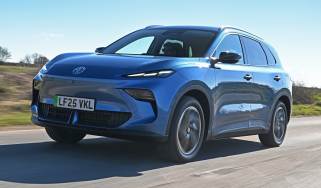New 2020 Porsche Panamera hybrid: 4 E-Hybrid, 4S E-Hybrid and Turbo S E-Hybrid models join plug-in range
Panamera range revamp for 2020 includes the introduction of three new plug-in hybrid models, including 690bhp Turbo S E-Hybrid
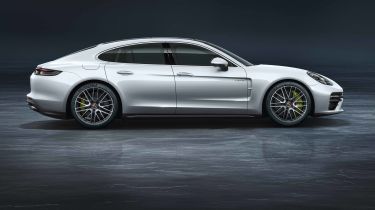
Porsche has revealed a range-wide update of its Panamera supersaloon, including three new plug-in-hybrid versions of the high-performance four-door, known as the 4 E-Hybrid, 4S E-Hybrid and Turbo S E-Hybrid (pictured above).
The 4 E-Hybrid is priced from £83,720 in standard form and from £85,870 as a 'Sport Turismo' estate. The 4S E-Hybrid starts at £101,690 in standard form, rising to £103,840 for the Sport Turismo. Finally, the range-topping Turbo S E-Hybrid will set you back £140,130 as a saloon and £142,280 as an estate.
Porsche Panamera 4 E-Hybrid: engine, power, performance, MPG & CO2
Porsche describes the drive system in all three of the new Panamera hybrids as "completely new", with the entry-level 4 E-Hybrid making 456bhp from its 2.9-litre turbocharged V6 petrol engine and 134bhp electric motor combination. It has a 0-62mph time of 4.4 seconds and a top speed of 174mph.
This is the most efficient of the three new Panamera hybrids, with official CO2 emissions from 45g/km and fuel economy ranging from 105 to 141mpg. That CO2 figure makes this the only one of the latest hybrid Panamera trio to fall into the 10% band for Benefit-in-Kind (BiK) company-car tax.
Porsche Panamera 4S E-Hybrid: engine, power, performance, MPG & CO2
The 4S E-Hybrid version (pictured above) puts out 552bhp in total. This model also uses a 2.9-litre turbocharged V6, but here the petrol engine makes 434bhp, while the electric motor is the same 134bhp unit from the 4 E-Hybrid.
Maximum torque is 750Nm, acceleration from 0-62mph takes 3.7 seconds and top speed is 185mph. Fuel economy in this case ranges from 94 to 105mpg, while CO2 emissions are between 61 and 69g/km.
Porsche Panamera Turbo S E-Hybrid: engine, power, performance, MPG and CO2
The Turbo S produces 690bhp, thanks to the pairing of a twin-turbocharged V8 petrol engine with the same 134bhp electric motor used by the 4 and 4S hybrids. That gives the range-topper a 0-62mph time of 3.2 seconds and a top speed just 4mph shy of 200mph. Fuel consumption for the Turbo S ranges from 95 to 105mpg according to official testing, which also returned CO2 emissions of 61-69g/km.
As the flagship of the Panamera hybrid range, the Turbo S come as standard with all currently available Porsche chassis and control systems such as the Porsche Dynamic Chassis Control Sport (PDCC Sport) electric roll stabilisation system, which includes Porsche Torque Vectoring Plus (PTV Plus) rear axle steering with Power Steering Plus, as well as the Porsche Ceramic Composite Brake (PCCB) system.
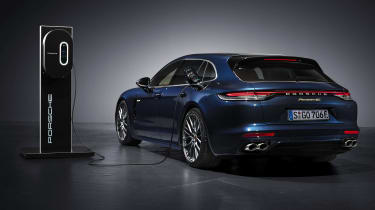
Electric range
Porsche also claims a 30% increase in electric range over previous Panamera hybrids. An increase in battery capacity to 17.9kWh (compared to the previous cars' 14.1kWh) sees the quoted electric range in city driving conditions rise to between 31 and 35 miles, from the old cars' 22 to 27 miles. Pure-electric, hybrid, charge hold, engine charge and performance-orientated Sport and Sport Plus driving modes are all available.
All three of the 4 E-Hybrid, 4S E-Hybrid and Turbo S E-Hybrid plug-in drivetrains are offered across the full range of Panamera, Panamera Executive (long-wheelbase) and Panamera Sport Turismo (estate, pictured above) bodystyles, although the Executive is special-order-only in the UK.
Exterior design tweaks include the previously optional 'Sport Design' nose styling – made up of air intake grilles, large side cooling openings and a single-bar front light module – now becoming standard on all models.
Elsewhere, the light strip across the tail of the car now runs seamlessly over the luggage compartment lid, connecting the two newly designed LED light clusters. Three new 20 and 21-inch wheel choices have been added to the wheel range; a total of 10 different designs are now available.
All models in the revised Panamera line-up also get improvements to their active suspension and roll-control systems, as well as steering and tyre tweaks, all intended to boost both comfort and handling.
Recommended
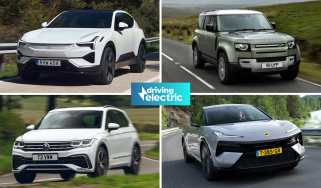
Slowest-depreciating electric and hybrid cars 2024
Most Popular

EV Deal of the Day: Dacia Spring is amazingly good value at £116 per month
